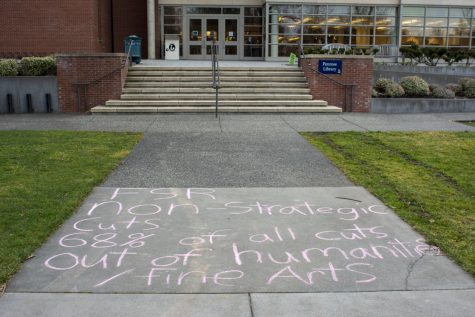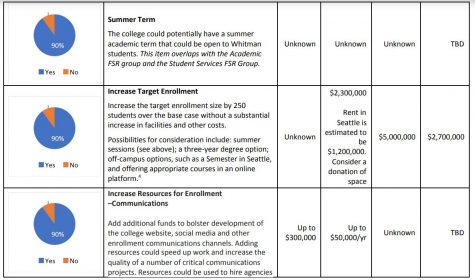Facing financial distress, Whitman forms first Financial Sustainability Review in recent history
February 18, 2021
Whitman has strayed from its standardized budgeting process to undergo a Financial Sustainability Review for the first time in recent history, according to Chief Financial Officer Peter Harvey. The administration created the review to address the immediate budgetary challenges posed by the COVID-19 pandemic as well as projected and current economic challenges faced by small liberal arts schools like Whitman.

President Kathy Murray announced the creation of the FSR during the Fall 2020 semester. Murray, along with elected representatives from faculty leadership, the Staff Advisory Council and ASWC, elected and appointed the students, faculty and staff that comprised the review’s three working groups. Charged with preparing a preliminary report to be shared for community feedback by Feb. 1, 2021, the three groups began meeting in Nov. 2020.
According to Harvey, Whitman tasked these subcommittees — on student support, academic programs and administrative units — with the goal of reducing overall spending by approximately $3.5 million for the fiscal 2022 budget.
According to Murray’s Feb. 2 community-wide email, subcommittees worked independently to develop programs that would build enrollment and revenue, and support Whitman’s liberal arts mission and strategic priorities.
In former years, the Office of the Chief Financial Officer would consolidate budget requests from individual departments into a proposed budget. After feedback from the President’s Advisory Committee, the President and Cabinet finalize a budget and propose it to the Board of Trustees. The Trustees make final decisions, adopt a budget in February and share the budget with the Whitman community in March.
Whitman reached this current point of financial precarity after years of financial struggles as a small liberal arts school collided with the added pressures of the COVID-19 pandemic. In an email to The Wire, Harvey reiterated the sentiments that Murray described in a Feb. 9 Zoom forum with the student body.
“It is important to note that we are not facing a crisis at this time, thanks to the careful management of the college over the years,” Harvey said. “This gives us the ability to plan thoughtfully for the near term and into the future.”
Murray’s Feb. 2 email emphasized the factors causing financial distress for Whitman and similar institutions:
“We have a declining population of 18-year-olds nationally (which we’ve all been reading about for years), a drop in interest in the type of education offered in liberal arts colleges, an applicant pool with greater financial need (the number of applicants to Whitman with an expected family contribution below $10,000 per year has doubled since 2016) and increasing price sensitivity among those most able to pay for this education.”

Harvey added that COVID-19-imposed challenges have exacerbated the college’s financial burden: an ASWC Q&A reported that Whitman is currently spending over $1 million in COVID-19 testing and protocols. With discounted tuition and the loss of room and board fees from the fall’s online semester, the college is taking in significantly less revenue.
Whitman is not alone in its financial struggles. The New York Times, in a 2019 article titled “Radical Survival Strategies for Struggling Colleges,” outlined the strategies taken by institutions considered to be Whitman’s competitors. Willamette University, for example, acquired the Claremont School of Theology and is hoping to increase enrollment from 2,700 to 4,000 students over the next ten years.
Next in the FSR process, the three subcommittees will incorporate feedback from Zoom forums, the online feedback forms shared by President Murray and a student-created anonymous feedback form to finalize their reports (i.e. lists of viable options) by March 1. President Murray and her Cabinet will review all three reports and pass them, along with the Cabinet’s recommendations, to the Board of Trustees. The Trustees will make final decisions about which proposals to adopt.
Members of the Whitman Community noted that a week is an insufficiently short window for submitting feedback on an issue central to the character and long-term plans of the college. From Feb. 8 to Feb. 15, almost 500 students signed a petition calling for the release of board minutes, greater transparency and more time to submit feedback on the FSR. Among other things, the petition requests the community be given until the beginning of April to provide feedback.





